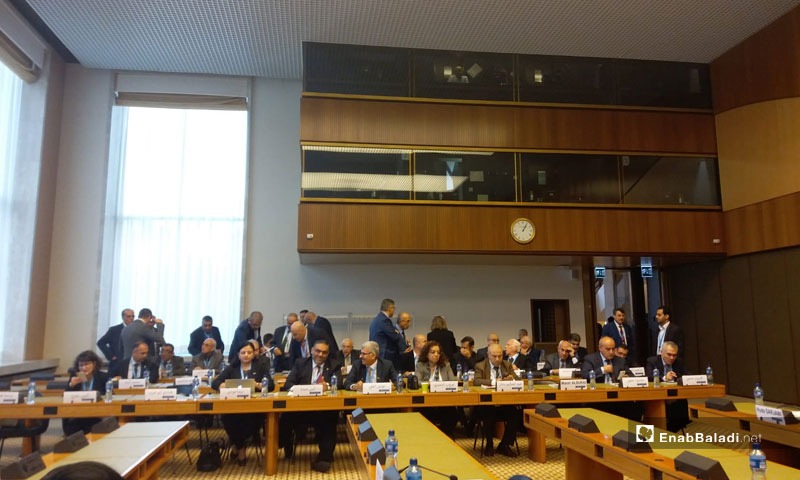



Enab Baladi – Ninar Khalifa
The Syrian Constitutional Committee’s first round of meetings that ended on 8 November in Geneva, Switzerland, witnessed discussions between delegations of the opposition, the regime and civil society under the auspices of the United Nations, amid international praise and support, especially by countries involved in the Syrian conflict.
On the last day of the work of the small-committee of the Constitutional Committee, the three groups, the opposition, the regime and civil society, presented non-papers that will be studied before the start of the second round of meetings scheduled for 25 November.
It was notable that the civil society paper was divided into two parts, as those close to the regime focused on “condemning the terrorist groups’ attacks in Aleppo and denouncing the economic sanctions imposed on Syria,” while members of the civil society group from the opposition stressed the need to “work for the immediate release of all prisoners of conscience by all parties in Syria, disclose the fate of the forcibly disappeared persons, and form a national committee to periodically monitor the release of detainees by all parties according to a specific timetable.”
This division raised many questions about the effectiveness and cohesion of the civil society group, which is a key body of the Constitutional Committee. In addition, there were evident differences of views within that body, prompting UN Envoy to Syria Geir Pedersen to hold several individual meetings with its members.
In this context, civil society group member Mazen Gharibah told Enab Baladi that “the civil society group is not homogeneous in terms of political and even legal opinions and positions.”
He pointed out that some of its members are clearly and publicly adopting a supportive approach to the delegation of the Syrian regime, while others emphasize their independence and their adherence to the values of civil society related to transparency, accountability, interrogation and the defense of victims’ rights.
Gharibah added that the absence of a co-chair for the civil society group, and the insistence of a number of its representatives from Damascus not to sit with the rest of the representatives without the presence of the Special Envoy Geir Pedersen, or one of his team members, prompted Pedersen or one of his assistants to make efforts to coordinate and manage the dialogues among the members of this group.
How is the performance of the civil society group assessed?
Mazen Gharibah ruled out the possibility of consensus among members of civil society in the foreseeable future, adding: “If we reach general consensus, it will be part of a broader consensus, inside and outside the Constitutional Committee.”
Regarding their concerns in the upcoming phase, Mazen Gharibah said that members of the civil society group will continue to develop constitutional visions and contents that preserve and protect the rights of victims and their families, and hold war criminals and human rights violators accountable, based on the principle of “no peace without justice, no justice without accountability,” as he put it.
With regards to the negative view of a wide segment of Syrians towards the work of the Constitutional Committee and its approach, Mazen Gharibah said it is common that the Syrians are not optimistic about any political or constitutional process unless it carries valuable steps that directly and tangibly affect their lives.
“As members of the civil society group, we share with the rest of the Syrians their doubts, fears and concerns about the work of this committee, but, given the current political deadlock and the total stagnation of the broader political process, we hope that the Constitutional Committee will succeed in creating a breakthrough that would be capable of moving forward the political wider path,” continued Gharibah.
He explained that their duty is to work with all the currently available tools, and in case they failed to do so, and reached a dead end and a fate similar to what the previous Geneva talks reached, then nothing will prevent them from withdrawing from all this process, as he put it.
Gharibah also pointed to the existence of international pressures for the success of this process, especially by Russia and Turkey. He said in this context: “We have seen a firm position by a number of envoys of acting countries in Syrian affairs towards the need to move forward and positively contribute in this process, and I think that we must build on this international consensus and use it in serving the interest of the widest possible segment of the Syrians.”
The Constitutional Committee’s second round of meetings is scheduled to start on November 25, and extend over five days, followed by a two-week break before the start of the third round in December.
if you think the article contain wrong information or you have additional details Send Correction